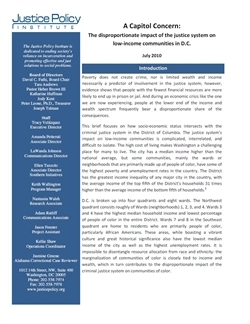
Poverty does not create crime, nor is limited wealth and income necessarily a predictor of involvement in the justice system; however, people with the fewest financial resources are more likely to end up in prison or jail. And the effects of an economic crisis like the one we are now experiencing are magnified for people with less income and wealth.
For this reason, the Justice Policy Institute chose to explore the connection between poverty and incarceration. Crime is down across the country, yet arrests and prison populations continue to increase, and disproportionately affect low-income communities and communities of color. This report focuses on the impact and overarching theme of poverty and its effects on a person’s life chances, as well as factors that have an influence on likelihood of justice involvement, such as housing, education, youth development, treatment, and employment. We conclude that through focusing on the well-being of communities and individuals, we will have the greatest impact on both public safety and poverty.
Download
Full Report
Executive Summary
Press Release
